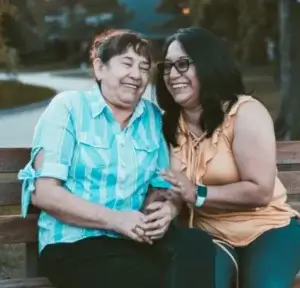![]()
![]()
 There is always a tendency for seniors to withdraw from society as they age. According to meta-analyses, social isolation or loneliness in seniors is linked to a 50% higher risk of dementia, a 30% higher risk of developing stroke, and a 26% higher risk of all-cause death. Based on the 2010 single-person household data by Statistics Korea, seniors residing alone show lower adherence to nutritional standards and healthy lifestyles. Furthermore, they show a lower frequency of health screenings for the early detection of chronic disorders. Consequently, solitary living among seniors may adversely impact their psychological well-being and physical health. As our loved ones age, their well-being should be our priority as caregivers, and one aspect that often goes overlooked is socialization. Socializing is not just a pleasant pastime; it offers numerous health benefits for seniors. It plays a role in enhancing their quality of life by providing them with opportunities for companionship, stimulation, and personal growth.
There is always a tendency for seniors to withdraw from society as they age. According to meta-analyses, social isolation or loneliness in seniors is linked to a 50% higher risk of dementia, a 30% higher risk of developing stroke, and a 26% higher risk of all-cause death. Based on the 2010 single-person household data by Statistics Korea, seniors residing alone show lower adherence to nutritional standards and healthy lifestyles. Furthermore, they show a lower frequency of health screenings for the early detection of chronic disorders. Consequently, solitary living among seniors may adversely impact their psychological well-being and physical health. As our loved ones age, their well-being should be our priority as caregivers, and one aspect that often goes overlooked is socialization. Socializing is not just a pleasant pastime; it offers numerous health benefits for seniors. It plays a role in enhancing their quality of life by providing them with opportunities for companionship, stimulation, and personal growth.
BENEFITS OF SOCIALIZING
- Emotional Well-Being: Interacting with others helps seniors combat feelings of loneliness and isolation. Regular social engagement can boost their mood, reduce stress levels, and even alleviate symptoms of depression.
- Cognitive Stimulation: Engaging in conversations and activities with others stimulates cognitive function. It challenges a senior’s brain to think critically, improves memory retention, and enhances problem-solving skills.
- Physical Health: Socializing can involve physical activities like group exercises or evening strolls. These activities help improve seniors’ mobility, strength, coordination, and cardiovascular health.
- Mental stimulation: Being part of social gatherings exposes seniors to new ideas, perspectives, and experiences that keep their minds sharp and active. Engaging in stimulating conversations fosters intellectual growth and helps to prevent cognitive decline.
- Sense of Purpose: Socialization gives seniors a sense of purpose by allowing them to contribute actively within their communities through volunteering or mentoring programs, giving them a renewed sense of value and self-worth.
TIPS FOR CAREGIVERS
- Plan Outings: for seniors who are physically able, family caregivers should prioritize walks, community events, or simple trips to encourage seniors’ interaction with others. Home health agencies can help with this as caregivers and home health aides can transport clients to events and offer standby assist with walks.
- Arrange Healthy Gatherings: family caregivers can organize small get-togethers for seniors with family members, friends or neighbors for game nights or tea parties.
- Encourage Technology Usage: introducing seniors to video calls helps them to reach out to distant loved ones, improves memory and cognitive function.
- Support Group Participation: connecting seniors with age-specific support groups for sharing experiences and forming connections is a great way to socialize, share thoughts and keep minds active.
Using the services of a home healthcare agency is a good option for families with senior loved ones living alone. Home care caregivers offer companionship as well as assistance with activities of daily living. They also can provide transportation to social functions and events or just for a trip out to run errands.
Allcare Home Health Agency, Inc. is available for your home health care needs in the Raleigh/Durham area. Call (919) 301-0236 today to schedule an in-home assessment! ![]()

